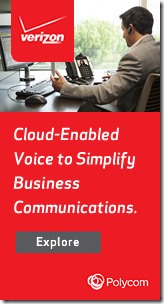Verizon VCE customer testimonial: Josh Finkle, DHI Services
This post, Part II of my series on Verizon Enterprise’s Virtual Communications Express, I spoke with Joshua Finkle of Deaf & Hard of Hearing Interpretation Services.
Company Background
Founded in 1996, DHIS helps facilitate interaction between two or more individuals on-site or remotely by interpreting their conversation with the help of certified interpreters in American Sign Language, foreign sign languages, Communications Access Real-time Translation (CART) and in spoken and/or signed English.
My interview of him was centered around the following:
Rationale
Josh’s primary reasons for thinking of moving a VOIP system was cost.
His prior phone system consisted of a total of four lines, of which one was a fax line. His broadband service was brought in through a DSL line.
He decided to reduce his costs, and also expand the telephony services he could consume.
Selection decision
As we all know, only voice-over-IP, commonly known as VOIP, can deliver based on those parameters.
Consequently, he started researching and auditioning available VOIP providers, and when the dust cleared, Verizon VCE was the winner. Verizon’s VCE was selected partly because his local PSTN was Verizon there in New York City.
He then discontinued his DSL line, and went with cable broadband.
Orchestration
One of the really cool things about Verizon VCE is the fact that orchestration is completely virtual.
Customers are interviewed over the phone by a Verizon salesdrone, and the pertinent information: number of users, type of device, service, and features desired are collected.
In conjunction with that information, a Verizon tool called Examinet is used to query and test the speeds and reliability of the broadband service the customer possesses in order to determine if that broadband connection is able to deliver the features, service, and reliability that VCE requires in order to deliver the VOIP connections the customer needs.
For Josh, this was a snap.
He answered the questions, had his broadband queried, and sent his business information over to Verizon for the initialization of the [phone numbers] porting process. In the interim, he participated in a webinar on the entire process.
His telephone devices arrived, and over a selected weekend, the entire process was implemented satisfactorily for him.
Summary 
What I really wanted to know, and I am sure you all do as well, is what is/was his satisfaction level with Verizon VCE at each step of his journey, and where is it today.
According to Josh, he “really likes his Verizon VCE setup.”
It has been a very cost-efficient implementation, and he has had no problems with the service. He is able to make configurational changes to his telephony network just by logging in to his VCE account, and letting his mouse and keyboard run across the page. His selections or changes are applied immediately, an aspect I know he must surely find gratifying.
He does, however, worry about his cable broadband service going down, an issue he cannot blame on Verizon VCE.
To my final question, “Would you recommend Verizon Virtual Communications Express to anyone, everyone?”, his answer was simply, “Of course.”
More information on Verizon Virtual Communications Express can be found here.
This blog post came out of conversations sponsored by Verizon.
Neither John Obeto, this blog, or any entity owned controlled or affiliated with John Obeto has received any compensation of any kind for this series on Verizon VCE.
John Obeto is CEO of Blackfriars Capital
© 2002 – 2015, John Obeto for Blackground Media Unlimited
